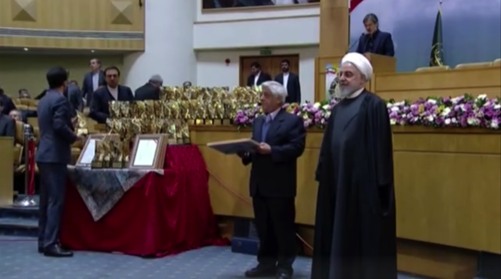Bolivia's caretaker president seeks to unite opposition to Morales as election battle reignites
January 14, 2020 - Original article: Reuters
by Adam Jordan, Monica Michicao
LA PAZ (Reuters) - Bolivia’s interim President Jeanine Anez is pushing to unite a divided opposition to secure an election win in May and prevent the return to power of the socialist party of ousted leader Evo Morales.
Anez, a 52-year-old conservative who took office amid a power vacuum following Morales’ resignation under pressure last year, said she was calling this week for a summit of political parties to help defeat Morales’ Movement to Socialism (MAS).
She said, however, that she currently has no plans to run herself. Morales himself is in Argentina and has said he will not take part in May’s election, but he is playing a key role in the campaign of the party he founded.
“If we dilute the vote obviously that will benefit Evo Morales,” Anez said in an interview with Reuters at the presidential palace in the historic center of La Paz. “We can not risk a return to the same 14 years of oppression and authoritarianism of Evo Morales, who is totally sick for power.”
The scrabble to unite the opposition underscores the challenge for Bolivia’s conservatives in an election that could be key in deciding the future direction of the gas and lithium rich nation.
Anez, president almost by chance after she took over according to a line of succession when Morales and his deputy resigned, is at the heart of a political storm that has rocked Bolivia, where the image of Morales was ubiquitous from public transport to sports stadia for more than a decade.
Morales stepped down on Nov. 10 after a disputed election victory a month earlier sparked protests and led to allies, police and military pulling their support.
The political upheaval has left stark divisions in the country, which is heading for new elections on May 3. Candidates for some of the biggest parties have not yet been selected.
Morales says Anez and others led a U.S.-backed coup against him. His critics say that he held onto power too long, including running for a fourth term in defiance of term limits.
A heavy police presence outside the presidential palace acts as a reminder of last year’s violent unrest. Anez denied any coup.
“It was a process won by all Bolivians when we went out into the streets to defend our democracy and freedom,” she said.
Her interim government’s establishment of a new electoral tribunal and a timetable for new elections was evidence it was not trying to cling to power, she added.
U.S. PIVOT
Under Anez, Bolivia has shifted 180 degrees in its foreign policy, moving away from Morales’ leftist allies in Venezuela and Cuba, and re-forging ties with the United States.
“Now that we are beginning an electoral process, we hope that they (United States) will help us, just as we are also receiving help from the European Union and the Organization of American States,” she said.
Anez said a technical team from USAID, the U.S. development agency that was kicked out of Bolivia by Morales in 2013, was in the country, holding meetings with government departments to assess possible collaboration around aid.
“We will receive it gladly - though I stress within the framework of our own sovereignty. We will work with them,” said Anez.
The shifting alliances have created issues for Bolivia, most prominently with leftist leaders in Mexico and Argentina. Bolivia expelled the Mexican ambassador over a diplomatic row while trade ties with Argentina have soured.
That has impacted negotiations over key exports of gas.
“We have done very well with Brazil but we have not yet entered into negotiations with Argentina, which will probably be more difficult,” Anez said, citing political and ideological differences.
Reporting by Adam Jourdan and Monica Machicao; Additional reporting by Danny Ramos and Joan Manuel Santiago Lopez; Editing by Daniel Flynn and Rosalba O'Brien
